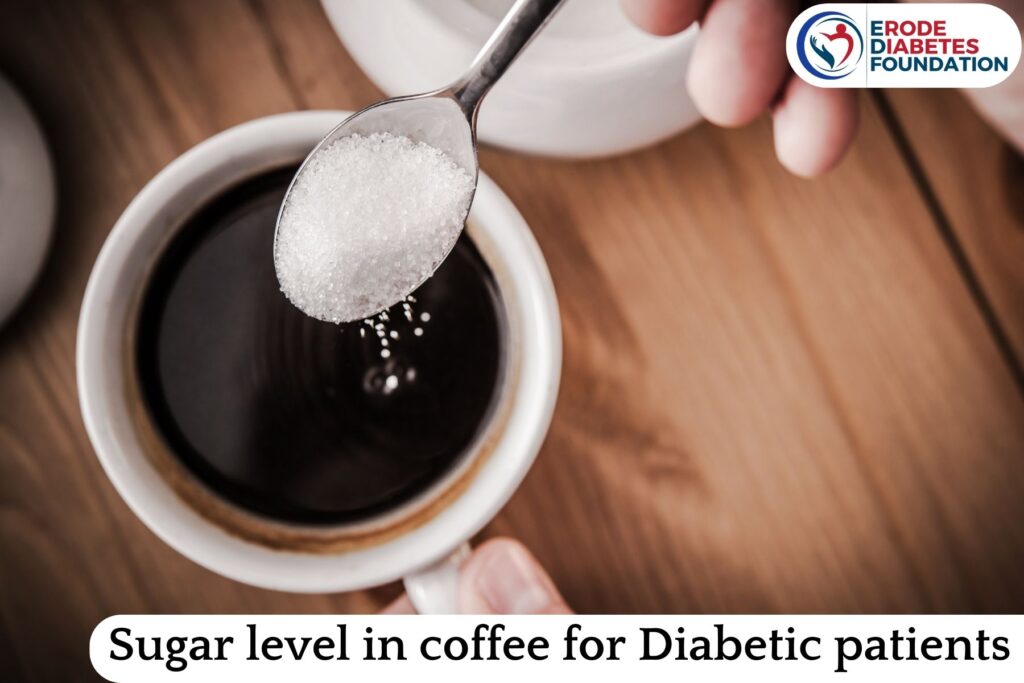You should abstain from consuming anything that can impact your blood sugar levels if you have diabetes. However, because of its deliciousness, a lot of diabetics drink coffee without realising how much sugar in coffee portion size. This blog helps you to clear up your confusion and suggest whether coffee consumption is good or bad for diabetics based on the sugar level in coffee.

The sugar level in coffee
Coffee’s glycemic index can change based on several variables, including the kind of bean, the degree of roasting, and the brewing technique. Moreover, sugar, milk, and cream are a few additional additives that might change the glycemic index of coffee. Thus, for those with diabetes, coffee can be a component of a healthy diet, but it’s crucial to select the proper kind and drink it in moderation.
Cappuccino and it’s nutritional value
The nutritional value of a cappuccino can vary depending on factors like the size of the cup, the type of milk used, and whether any additional ingredients or toppings are added. Here’s a general overview based on a standard serving size:
- Calories: A typical cappuccino made with whole milk and no added flavours or syrups might have around 70-100 calories for an 8-ounce cup.
- Protein: Cappuccino provides a moderate amount of protein, usually around 5-7 grams per serving, primarily from the milk.
- Fat: The fat content will depend on the type of milk used. A cappuccino made with whole milk will have a higher fat content compared to one made with skim milk. Further, it can range from 4-8 grams of fat per serving.
- Carbohydrates: The carbohydrate content is mainly from the lactose in milk and can range from 6-10 grams per cup.
- Caffeine: Cappuccinos contain caffeine from the coffee, providing an energy boost. The exact amount varies based on factors like the type of coffee bean and brewing method.
- Calcium: Cappuccinos made with milk is a good source of calcium, contributing to bone health. A standard serving might provide around 150-200 milligrams of calcium.
- Vitamins: Milk in cappuccinos contains essential vitamins such as vitamin D, which aids in calcium absorption, and B vitamins like riboflavin and vitamin B12.
- Sugar Content: The sugar content in a cappuccino is generally low if no sugar is added during preparation. However, flavoured syrups or sweeteners can significantly increase the sugar content.
- Dietary Fiber: Cappuccinos typically do not contain dietary fiber, as coffee itself is low in fiber. Including fiber-rich foods in your diet is essential for overall health.
- Hydration: While coffee has a diuretic effect, the milk in cappuccinos contributes to overall hydration. However, it’s still important to balance coffee consumption with water intake for optimal hydration.
- Coffee Bean Varieties: The choice of coffee beans influences the flavour and potential health benefits of a cappuccino. Different varieties offer unique taste profiles, and some may contain higher levels of antioxidants.
Alternatives:
- Milk Alternatives: For those with lactose intolerance or dietary preferences, cappuccinos can be made with various milk alternatives such as almond, soy, or oat milk. Moreover, the nutritional characteristics of these alternatives could differ.
- Acidity: Coffee, including cappuccinos, can be slightly acidic. If you have acid reflux or a sensitive stomach, choosing a lower-acid coffee bean or opting for a coffee blend with reduced acidity may be preferable.
- Decaffeinated Options: For individuals looking to reduce caffeine intake, decaffeinated cappuccinos are available. They offer a similar taste without the stimulating effects of caffeine.
- Potential Health Benefits: Some studies suggest that moderate coffee consumption may be associated with certain health benefits, such as a reduced risk of certain diseases like Parkinson’s and Alzheimer’s. However, individual responses can vary, and excessive caffeine intake should be avoided.
Remember that adding sugar, syrups, or whipped cream can significantly increase the calorie and carbohydrate content. For those with diabetes, choosing lower-fat milk or milk alternatives, and avoiding or minimizing added sugars, can help manage blood sugar levels better.
If you have specific health concerns or dietary restrictions, consulting with a healthcare professional or a registered dietitian is recommended.
To sum up
Always be mindful of your own health conditions, preferences, and dietary requirements when enjoying cappuccinos or any coffee beverages. If you have specific concerns, consulting with a healthcare professional or a nutrition expert can provide tailored advice.


